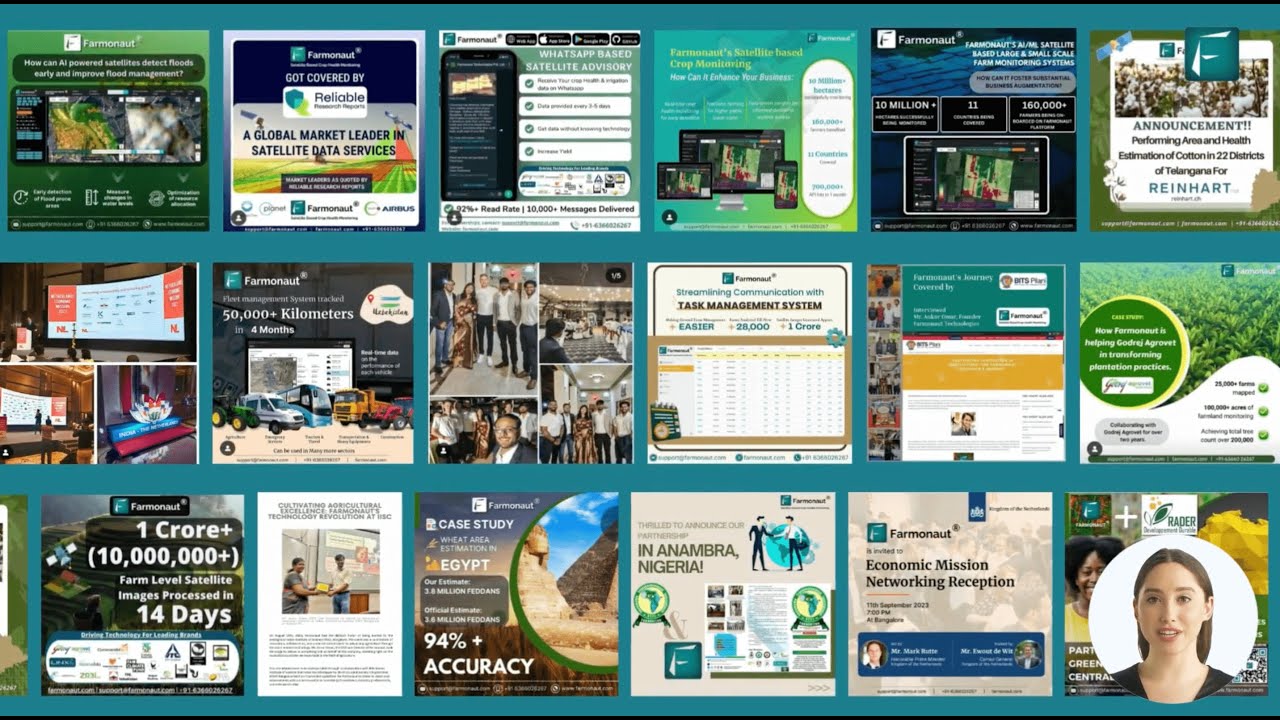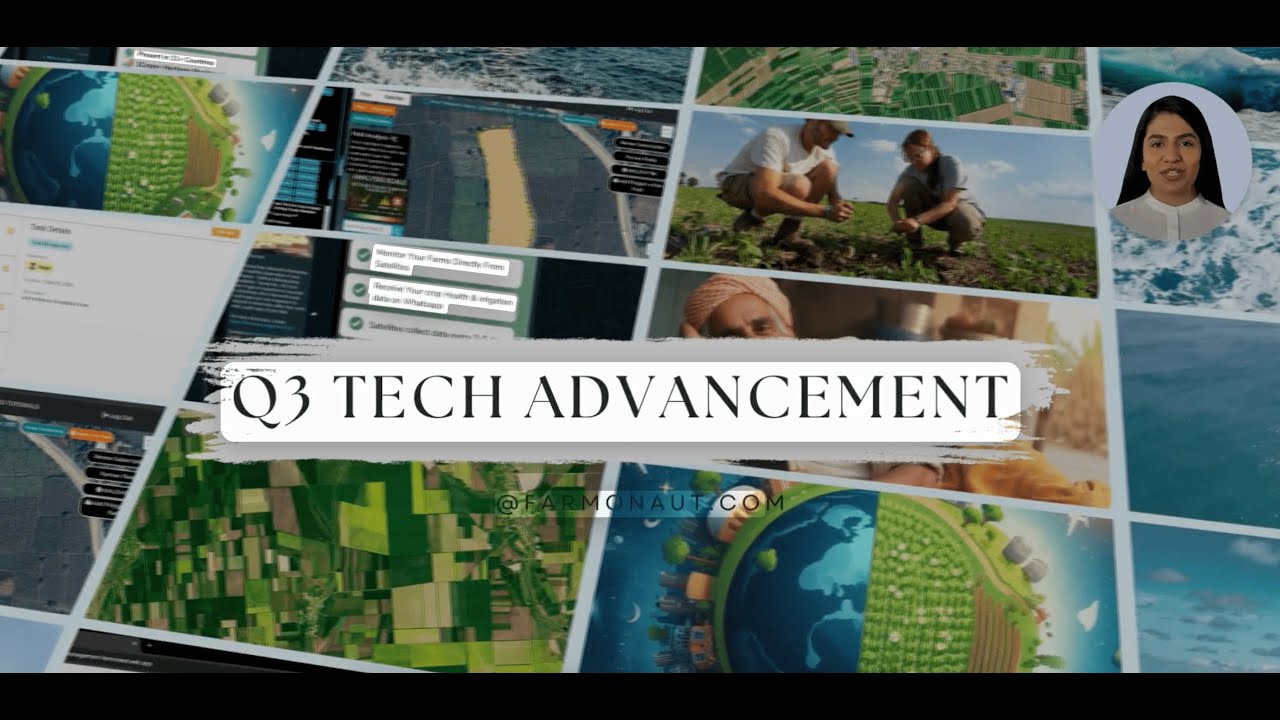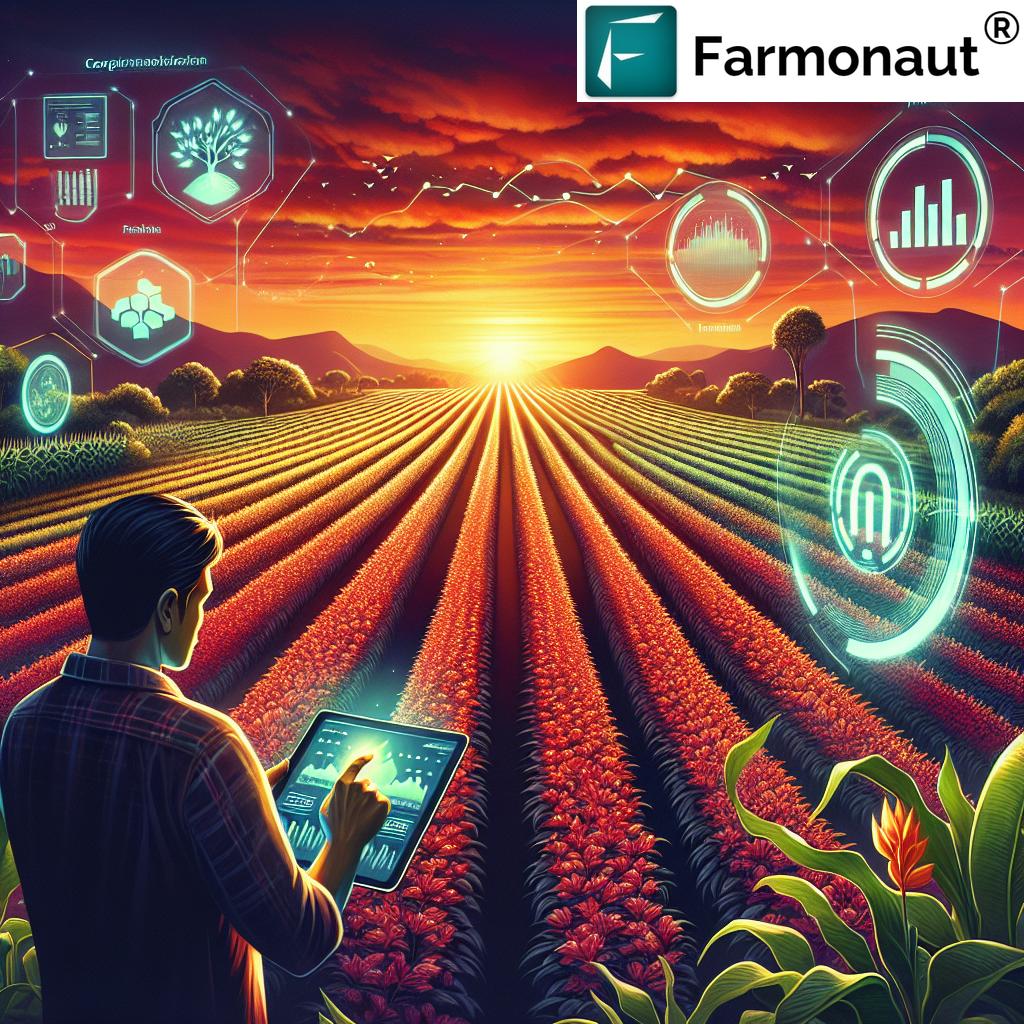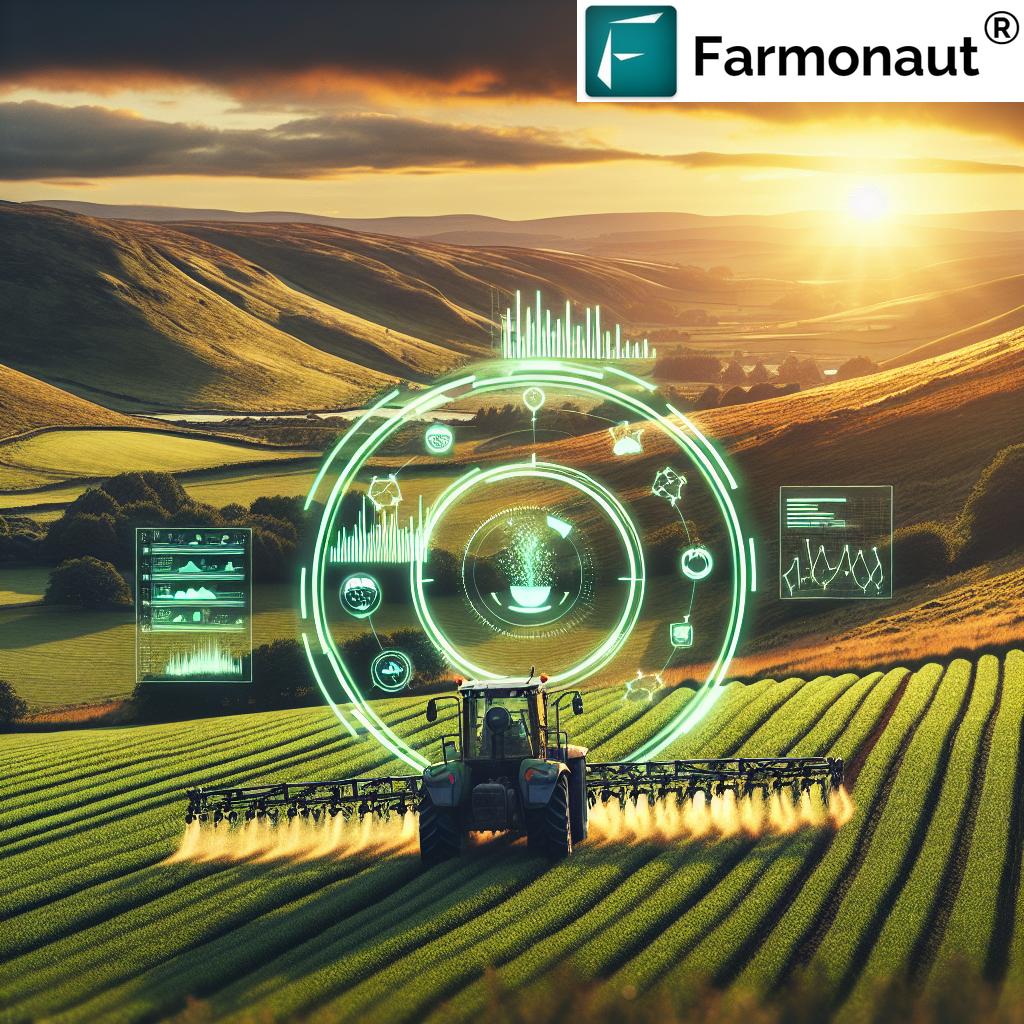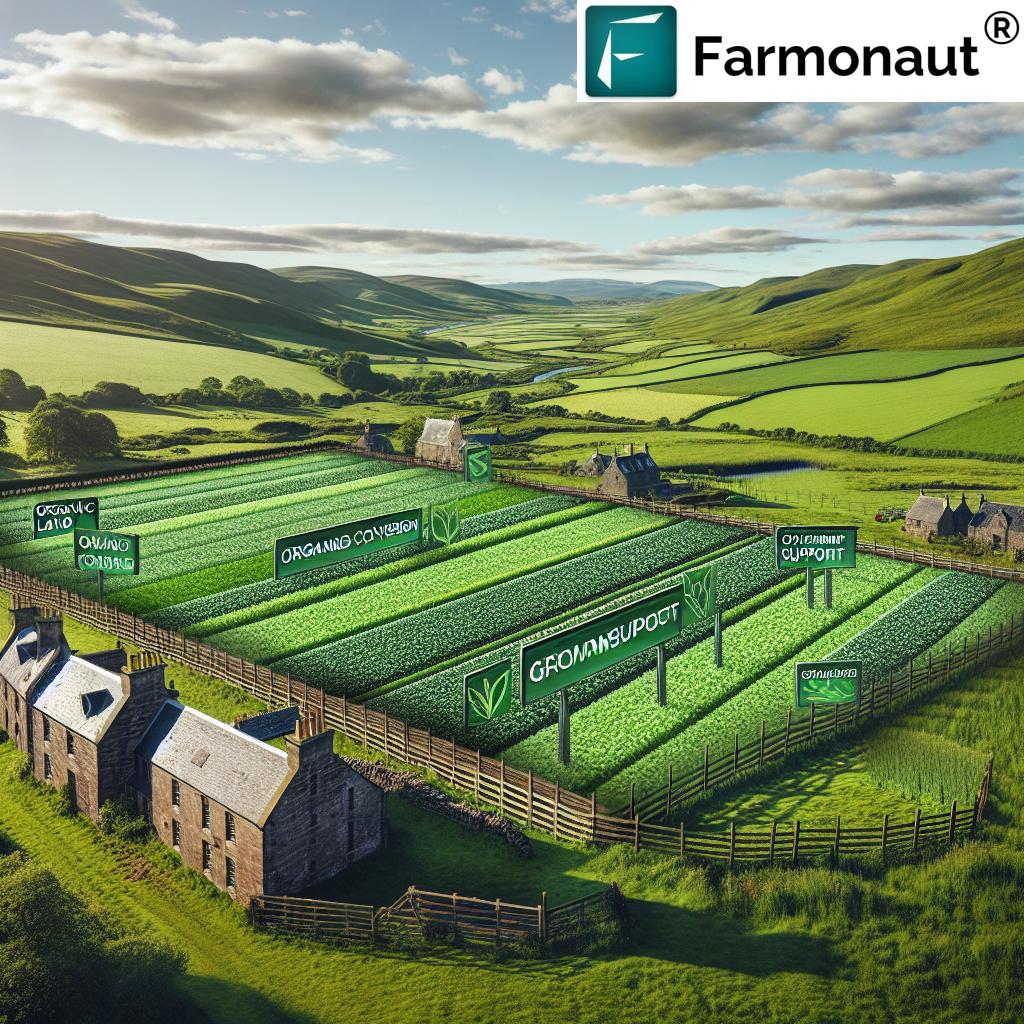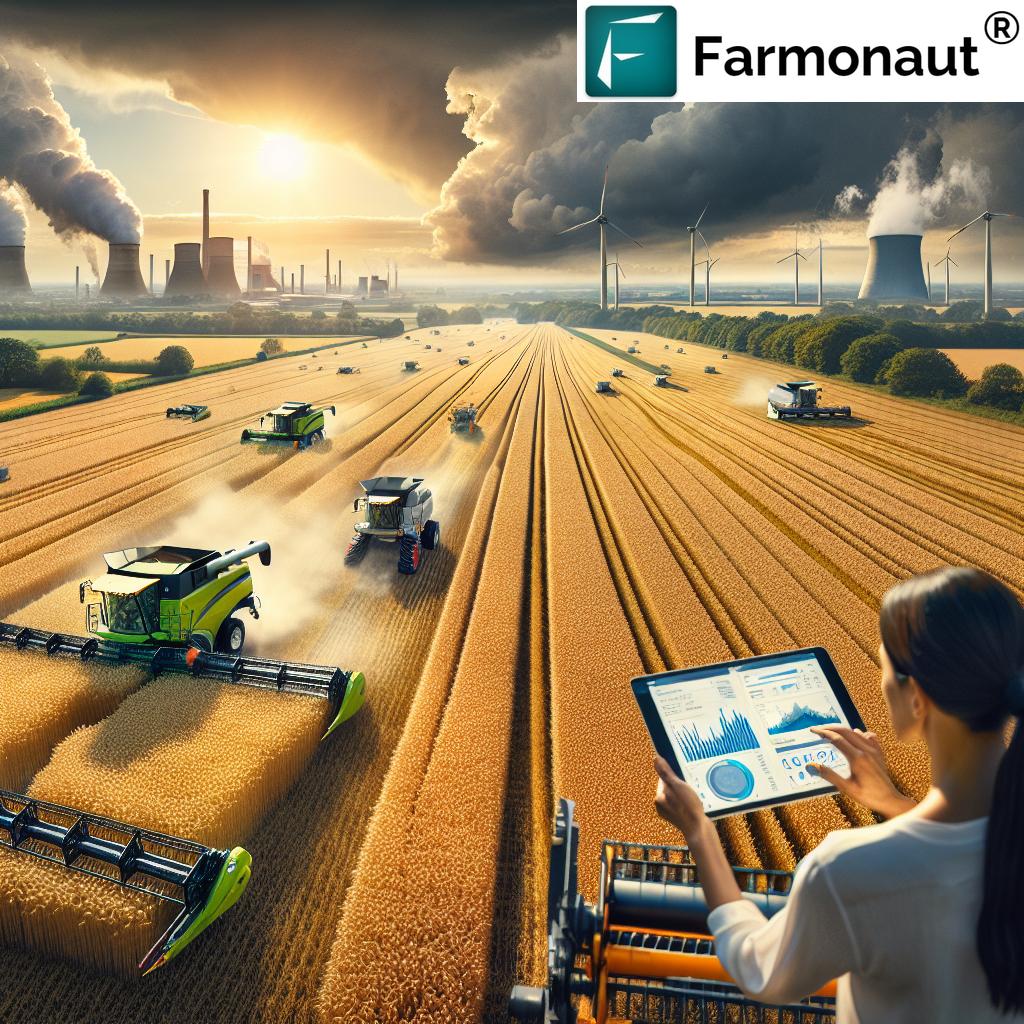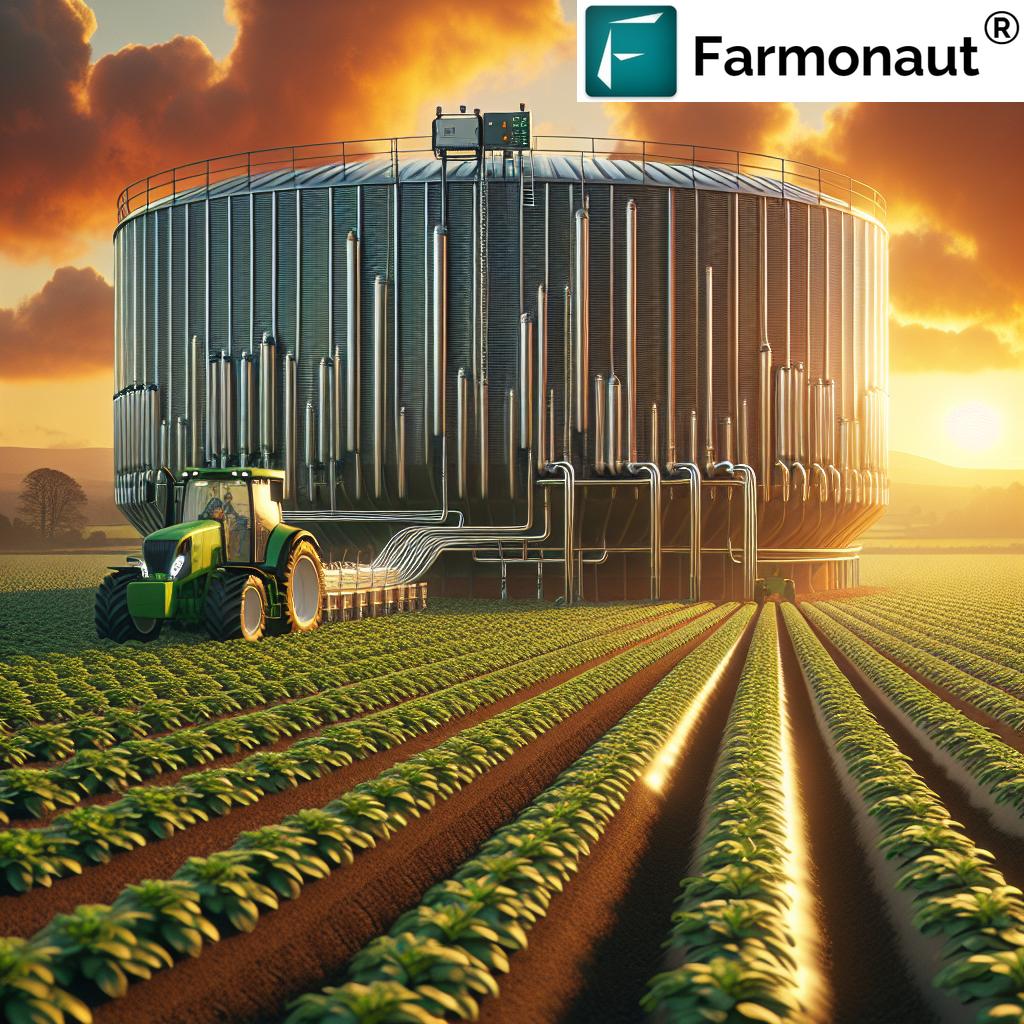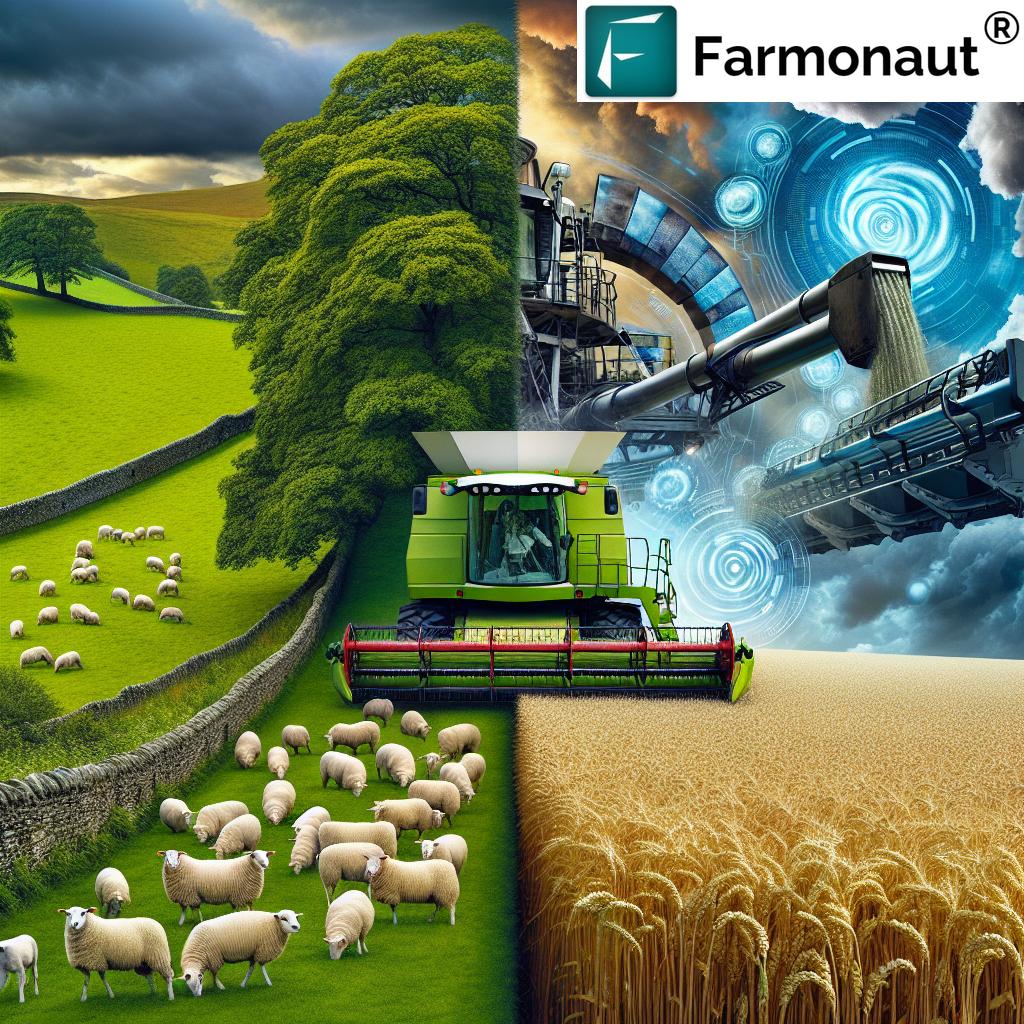UK Agriculture Crisis: How Farmonaut’s Tech Solutions Address Food Supply Chain Challenges
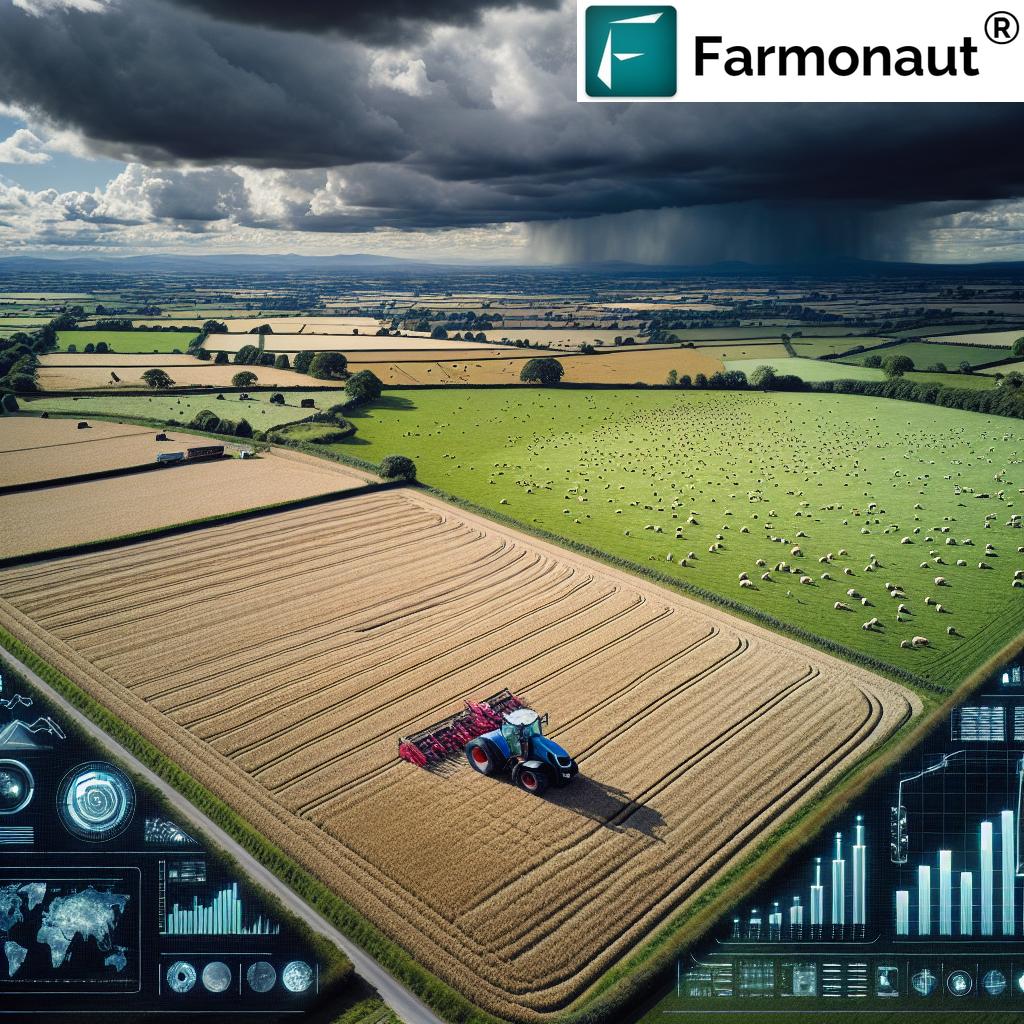
“Brexit has contributed to a 13% decrease in UK agricultural exports since 2019, impacting food supply chains.”
The United Kingdom’s agricultural sector is facing unprecedented challenges as food supply chains reach a critical breaking point. As we delve into the complexities of this crisis, we’ll explore how innovative agritech solutions, particularly those offered by Farmonaut, are playing a crucial role in addressing these issues. Our focus will be on the UK farming industry’s struggles with sustainable agriculture practices, labor shortages, and the far-reaching impacts of Brexit on agriculture.
The Perfect Storm: Brexit, Climate Change, and Labor Shortages
The UK agriculture sector is weathering a perfect storm of challenges that threaten food security and the stability of domestic food production. Let’s break down these issues:
- Brexit Impact: The UK’s departure from the European Union has significantly disrupted agricultural trade and labor markets.
- Climate Change: Shifting weather patterns and extreme events are affecting crop yields and livestock management.
- Labor Shortages: A decrease in seasonal workers has left many farms struggling to harvest crops efficiently.
These factors combined have created a pressing need for innovative solutions to strengthen supply chains and promote resilience in UK agriculture.
Brexit’s Agricultural Aftermath
The impact of Brexit on UK agriculture has been profound. New trade regulations have complicated the export process for UK farmers, leading to increased costs and logistical hurdles. The food supply chain crisis in the UK has been exacerbated by these changes, with many farmers finding it challenging to maintain their previous levels of productivity and profitability.
Key Brexit Impacts on UK Agriculture:
- Increased paperwork and customs checks for exports
- Higher costs for importing essential farming inputs
- Reduced access to EU labor markets for seasonal work
- Changes in agricultural subsidies and support systems
These challenges have highlighted the urgent need for agricultural policy solutions that can help farmers adapt to the new post-Brexit landscape.
Climate Change: A Growing Threat to UK Farming
“Climate change is projected to reduce UK crop yields by up to 25% by 2050, threatening domestic food production.”
Climate change and farming are inextricably linked, with the agricultural sector both contributing to and suffering from the effects of global warming. For UK farmers, the challenges posed by climate change are becoming increasingly apparent:
- Unpredictable weather patterns affecting planting and harvesting schedules
- Increased frequency of extreme weather events like floods and droughts
- Changes in pest and disease patterns impacting crop health
- Shifts in suitable growing regions for traditional UK crops
These climate-related challenges underscore the importance of adopting sustainable agriculture practices and leveraging technology to mitigate risks.
Labor Shortages: A Critical Gap in the Food Supply Chain
Agricultural labor shortages have become a critical issue for UK farmers, particularly in the wake of Brexit and the COVID-19 pandemic. The reduction in available seasonal workers from EU countries has left many farms struggling to harvest crops efficiently, leading to potential food waste and reduced production capacity.
Impacts of Labor Shortages:
- Unharvested crops leading to financial losses for farmers
- Increased labor costs as farms compete for a smaller pool of workers
- Pressure to automate certain farming tasks to reduce reliance on manual labor
- Potential reduction in crop diversity as farmers focus on less labor-intensive crops
Addressing these labor challenges is crucial for maintaining the UK’s domestic food production capabilities and ensuring food security.
The Role of Agritech in Addressing UK Farming Challenges
In the face of these multifaceted challenges, agritech innovations are emerging as a beacon of hope for the UK farming industry. Companies like Farmonaut are at the forefront of developing technological solutions to address the pressing issues facing UK agriculture.
How Agritech is Transforming UK Farming:
- Precision agriculture techniques for optimizing resource use
- AI-driven crop monitoring and management systems
- Blockchain technology for improving supply chain transparency
- Automated farming equipment to address labor shortages
These technological advancements are helping farmers adapt to the changing landscape of UK agriculture, improving efficiency and sustainability in the process.
Farmonaut’s Tech Solutions for UK Agriculture
Farmonaut, a leading agritech company, offers a range of innovative solutions tailored to address the specific challenges facing UK agriculture. By leveraging advanced technologies such as satellite imagery, AI, and blockchain, Farmonaut is helping farmers optimize their operations and navigate the complexities of the current agricultural landscape.
Key Farmonaut Solutions for UK Farmers:
- Satellite-Based Crop Health Monitoring: Real-time insights into crop health and soil conditions
- AI-Powered Advisory Systems: Personalized recommendations for crop management and resource allocation
- Blockchain-Based Traceability: Enhancing transparency and trust in agricultural supply chains
- Resource Management Tools: Optimizing the use of water, fertilizers, and other inputs
These solutions are designed to help UK farmers improve productivity, reduce costs, and adapt to changing environmental conditions.
Addressing Food Security in the UK
Food security in the UK has become a pressing concern in light of recent challenges. The disruptions caused by Brexit, climate change, and labor shortages have highlighted the vulnerabilities in the UK’s food supply chains. Ensuring a stable and sufficient food supply for the population requires a multifaceted approach that combines policy initiatives, technological innovation, and sustainable farming practices.
Strategies for Enhancing UK Food Security:
- Diversifying food sources and reducing reliance on imports
- Investing in domestic food production capabilities
- Implementing policies to support sustainable farming practices
- Leveraging technology to improve agricultural productivity and resilience
Farmonaut’s solutions play a crucial role in this effort by providing farmers with the tools they need to optimize their operations and increase yields sustainably.
The Importance of Sustainable Agriculture Practices
As the UK grapples with the challenges facing its agricultural sector, the adoption of sustainable agriculture practices has never been more critical. These practices not only help mitigate the environmental impact of farming but also contribute to long-term food security and economic stability for farmers.
Key Sustainable Agriculture Practices:
- Crop rotation and diversification
- Precision irrigation and water management
- Integrated pest management
- Soil conservation techniques
- Reduced use of chemical inputs
Farmonaut’s technology supports these practices by providing farmers with data-driven insights that enable more efficient and environmentally friendly farming methods.
Innovations in Agricultural Policy
To address the complex challenges facing UK agriculture, innovative agricultural policy solutions are essential. These policies must balance the need for food security, environmental protection, and economic viability for farmers.
Emerging Policy Trends:
- Incentives for adopting sustainable farming practices
- Support for agritech innovation and adoption
- Programs to attract and train new entrants to farming
- Policies to improve supply chain resilience and reduce food waste
By aligning policy initiatives with technological advancements like those offered by Farmonaut, the UK can create a more robust and sustainable agricultural sector.
The Future of UK Agriculture: Challenges and Opportunities
As we look to the future of UK agriculture, it’s clear that both challenges and opportunities lie ahead. While the sector faces significant hurdles, the potential for innovation and transformation is immense.
Key Areas of Focus for the Future:
- Continued investment in agritech research and development
- Adaptation of farming practices to changing climate conditions
- Development of new crop varieties suited to UK growing conditions
- Strengthening local food systems and shortening supply chains
- Enhancing collaboration between farmers, researchers, and technology providers
By embracing these opportunities and leveraging solutions like those provided by Farmonaut, UK agriculture can overcome current challenges and build a more resilient and sustainable future.
Explore Farmonaut’s API for advanced agricultural data integration
Farmonaut’s Role in Shaping the Future of UK Farming
Farmonaut is playing a pivotal role in shaping the future of UK farming by providing innovative technological solutions that address key challenges in the sector. By leveraging satellite imagery, AI, and blockchain technology, Farmonaut is empowering farmers to make data-driven decisions that improve productivity, sustainability, and resilience.
How Farmonaut is Transforming UK Agriculture:
- Providing real-time crop health monitoring to optimize resource use
- Offering AI-powered advisory services for improved decision-making
- Enhancing supply chain transparency through blockchain technology
- Supporting sustainable farming practices with data-driven insights
- Helping farmers adapt to climate change through advanced weather forecasting and risk assessment tools
These innovations are crucial in helping UK farmers navigate the complexities of modern agriculture and build a more sustainable and productive farming sector.
Overcoming Challenges in Food Sourcing and Supply Chains
The complexities of sourcing essential food imports and managing domestic supply chains have become increasingly apparent in the UK’s current agricultural landscape. Brexit has introduced new hurdles in international trade, while climate change and labor shortages have disrupted traditional supply chain models.
Strategies for Improving Food Sourcing and Supply Chains:
- Diversifying import sources to reduce reliance on single regions
- Investing in domestic production capabilities for key food items
- Implementing blockchain technology for improved traceability and transparency
- Developing more efficient logistics and distribution networks
- Leveraging data analytics to predict and mitigate supply chain disruptions
Farmonaut’s blockchain-based traceability solutions are particularly valuable in this context, helping to ensure transparency and efficiency throughout the supply chain.
Access Farmonaut’s API Developer Docs for seamless integration
The Economic Impact of Agricultural Challenges
The challenges facing UK agriculture have significant economic implications, not only for farmers but for the entire food industry and broader economy. Rising production costs, coupled with uncertainties in trade and labor markets, are putting pressure on farm profitability and food prices.
Economic Factors Impacting UK Agriculture:
- Increased input costs (e.g., fertilizers, energy, machinery)
- Fluctuations in currency exchange rates affecting trade
- Changes in subsidy structures post-Brexit
- Labor cost increases due to shortages
- Market volatility and price uncertainties
Farmonaut’s solutions help address these economic challenges by improving operational efficiency and reducing waste, thereby helping farmers maintain profitability in a challenging environment.
Collaborative Efforts for a Sustainable Future
Addressing the complex challenges facing UK agriculture requires a collaborative approach involving farmers, policymakers, researchers, and technology providers. By working together, these stakeholders can develop comprehensive solutions that address the multifaceted nature of the current crisis.
Key Areas for Collaboration:
- Research and development of climate-resilient crop varieties
- Knowledge sharing and best practice dissemination
- Public-private partnerships for agritech innovation
- Cross-sector initiatives to improve supply chain resilience
- Joint efforts to attract and train the next generation of farmers
Farmonaut is committed to fostering these collaborative efforts by providing a platform that connects various stakeholders and facilitates the sharing of crucial agricultural data and insights.
UK Agriculture Crisis: Key Challenges and Proposed Solutions
| Challenge | Impact | Farmonaut’s Solution |
|---|---|---|
| Brexit’s impact on trade | 13% decrease in agricultural exports since 2019 | Blockchain-based traceability for improved supply chain management |
| Labor shortages | Estimated 70,000 seasonal worker shortage in 2021 | AI-powered automation and resource optimization tools |
| Climate change effects | Projected 25% reduction in crop yields by 2050 | Satellite-based crop health monitoring and AI advisory for climate adaptation |
| Rising production costs | 15-20% increase in input costs over the past year | Precision agriculture tools for efficient resource utilization |
| Food import complexities | 30% increase in import-related bureaucracy | Data analytics for supply chain optimization and risk assessment |
The Path Forward: Integrating Technology and Traditional Farming
As we navigate the challenges facing UK agriculture, it’s clear that the path forward lies in effectively integrating cutting-edge technology with traditional farming practices. This fusion of old and new can create a more resilient, sustainable, and productive agricultural sector.
Key Strategies for Integration:
- Educating farmers on the benefits and use of agritech solutions
- Developing user-friendly interfaces for complex technological tools
- Ensuring technology complements rather than replaces traditional farming knowledge
- Creating support systems to help farmers transition to tech-enabled farming
- Fostering a culture of innovation and experimentation in the farming community
Farmonaut’s approach aligns perfectly with this integration strategy, offering sophisticated technological solutions that are accessible and beneficial to farmers of all scales.
Conclusion: A Resilient Future for UK Agriculture
The UK agriculture sector stands at a critical juncture, facing unprecedented challenges but also presented with remarkable opportunities for transformation. By embracing innovative technologies, sustainable practices, and collaborative approaches, the industry can overcome current hurdles and build a more resilient and productive future.
Farmonaut’s suite of advanced agritech solutions plays a crucial role in this transformation, offering UK farmers the tools they need to navigate complex challenges and thrive in an evolving agricultural landscape. From satellite-based crop monitoring to AI-powered advisory services and blockchain-enabled traceability, Farmonaut’s technologies are helping to shape a new era of smart, sustainable farming in the UK.
As we move forward, the continued integration of technology, policy support, and sustainable practices will be key to ensuring food security, environmental stewardship, and economic viability for UK agriculture. By working together and leveraging the power of innovation, we can create a stronger, more resilient food system that benefits farmers, consumers, and the environment alike.
FAQ Section
Q: How is Brexit affecting UK agriculture?
A: Brexit has led to increased paperwork for exports, higher costs for importing farming inputs, reduced access to EU labor markets, and changes in agricultural subsidies. These factors have contributed to a 13% decrease in UK agricultural exports since 2019.
Q: What role does technology play in addressing UK farming challenges?
A: Technology, such as Farmonaut’s solutions, plays a crucial role by offering precision agriculture techniques, AI-driven crop monitoring, blockchain for supply chain transparency, and automated systems to address labor shortages.
Q: How is climate change impacting UK farming?
A: Climate change is causing unpredictable weather patterns, increased frequency of extreme events, changes in pest and disease patterns, and shifts in suitable growing regions. It’s projected to reduce UK crop yields by up to 25% by 2050.
Q: What are some sustainable agriculture practices being adopted in the UK?
A: Key sustainable practices include crop rotation, precision irrigation, integrated pest management, soil conservation techniques, and reduced use of chemical inputs. Farmonaut’s technology supports these practices with data-driven insights.
Q: How can farmers access Farmonaut’s solutions?
A: Farmers can access Farmonaut’s solutions through their web application, Android and iOS mobile apps, and API integrations. These platforms offer various tools for crop monitoring, resource management, and decision support.


